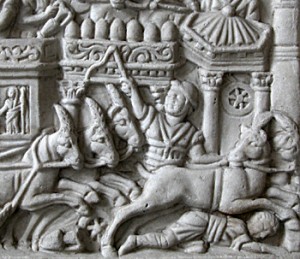 Okay, my blogging is a mess. There, I said it. And once you slow down it gets hard to go again …
Okay, my blogging is a mess. There, I said it. And once you slow down it gets hard to go again …
I think I have the problem of Stephen Leacock’s rider who “flung himself from the room, flung himself upon his horse and rode madly off in all directions.” In posting about horses and history, as well as information about my book trilogy (the supposed reason for this whole enterprise, quiet as it’s kept) I’ve mixed a bowl of porridge.
And it’s going to get worse, I’m afraid. I made the attempt to run separate blogs, which translated into lots of techie fudging about without much writing, and got very bogged down. Bogged in a blog.
So I’m throwing it up into the air: any sense that is to be made of this space in the future will proceed from these thoughts…
a) Horses and human history are inextricably intertwined…
b) Progress in horsemanship mirrors progress in human society…
b) I suspect this is not a coincidence, and I’m curious about it.
Because of my curiosity, I came to write a work exploring horsemanship using factual history wrapped into a fiction adventure story, a trilogy, to which this blog is dedicated.
In between hot news flashes about the books of the trilogy, this blog is subject to the author’s ranging interests on horsemanship and history–neither of which topics are less than vast. I hope people will join me for the ride as I saddle up for the new season; yes I will probably use horse-puns and such. It’s hay-larious! (Okay, I won’t use that many.)
So Welcome, autumn in New England, as well to any fans who’ve met Meagan and Promise and found an intriguing bit of fun and even magic in their literary journey. Maybe we’ll find some interesting truths in the wind of a gallop and the ancient rhythms of hoofbeats …
 A new
A new  Naufragia was ultimate disaster, an end not only to hopes of victory but to lives, careers, destiny. A favorite champion could be undone in an instant—every moment of a chariot race was fraught with potential disaster. The extremes of emotion provoked by collisions and near disasters shocked spectators into wild states of euphoria and despair.
Naufragia was ultimate disaster, an end not only to hopes of victory but to lives, careers, destiny. A favorite champion could be undone in an instant—every moment of a chariot race was fraught with potential disaster. The extremes of emotion provoked by collisions and near disasters shocked spectators into wild states of euphoria and despair. ECLIPSED BY SHADOW was named a July 4th Display Title by the
ECLIPSED BY SHADOW was named a July 4th Display Title by the